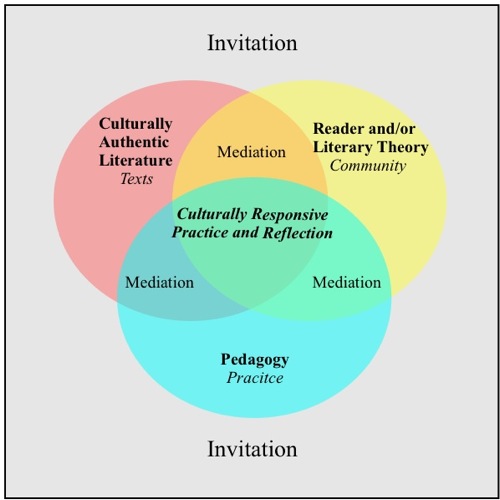By Marie LeJeune & Tracy Smiles, Western Oregon University

This month in WOW Currents we explored theoretical intersections and instructional challenges to using multicultural and international children’s literature with students of all ages. We began by creating a framework that articulated the theoretical frames that inform our practice and reflection, and provided examples from our teaching experiences in schools, in “out of school spaces,” and with preservice teachers. We heard from a variety of readers who have pushed us as teachers and researchers, and engaged in discussions with each other on the complexity of teaching literature, and our personal journeys as literacy educators. For this last blog entry we’d like to reflect back and respond to some of the issues raised for us around multicultural and international literature as we wrote for WOW Currents this month.
The post that received the most comments was our second, which described using Faithful Elephants and The Librarian of Basra in a high school language arts classroom. In this post we received a comment from Tim, who reminded us that response to text comes from the transaction between the reader and the text, and that while some students’ responses to The Librarian of Basra were problematic from our perspectives, these same students were indeed trying to see beyond the text “. . . if only just a little bit.” We were reminded by Tim’s comment that it is our charge to meet students where they are personally and developmentally and work together towards deeper possibilities texts might offer us all as we look at the world. We loved the suggestions posted by teachers like Mary and Eryn, who reminded us that taking on a critical stance takes time, but as Jeanne emphasized, it is important, and that positioning is a fruitful frame for pushing students while still honoring voice.
Not posted on the blog was another response we received from a scholar who had done research on the “true” story ofThe Faithful Elephants. He criticized Marie’s use of the book, contending,
- As so often with blog entries on this topic I’m surprised that teachers seem to be able to present kids with this book without having done any research about it. It has been pointed out before (in Japan since 1981, in the US since an article in Bookbird in 1998, also to be found on the net) that not a single bomb fell on Tokyo in the whole of 1943, the year the elephants in Ueno Zoo were starved to death. In fact, as I showed incidentally in a historical study (http://japanfocus.org/-Frederick_S_-Litten/3225), pretty much all of the book is fiction. It seems strange that teachers use this book to somehow gauge or incite critical reactions in children, while being wholly uncritical about it themselves.
While we disagree with this reader’s tone and deficit perspective on how teachers choose the texts they use in the classroom, he raised several questions for us. While it is true that Faithful Elephants does not accurately portray all historical events of the time period, does that negate the effectiveness of its use for, in Marie’s case, using the text to help her students more fully appreciate the mandated text (Farewell to Manzanar) she was required to teach? Can stories that show multiple perspectives on war but take creative license with some factual events still have power if they are presented as interpretations to students? Is authenticity the most important lens for evaluating a text to use in the classroom or do thematic and other cultural elements also offer value for reading? We’re still negotiating many of these ideas ourselves, although the email we received does remind us of the importance of investigating and critiquing the ways in which texts and authors position us as readers and interpreters of literature, history, and culture.
In all of our blog entries, we have endeavored to reflect deeply on the power of literature and pedagogy in our classrooms. We ultimately come back to the following quote by Jerome Harste (2003) in an article where he defined what makes a good language arts program for the 21st Century, as we conclude our Month of Mondays on WOW Currents:
“While the materials we read is an issue, even more of an issue is what social practices we institute around our discussion of books” (p. 9).
The social practices we described, examined, and engaged in ourselves while writing for this blog offered opportunities for us to make meaning, ask critical questions, and reflect deeply on the proficiencies our students need to be literate citizens in the 21st Century. We look forward to our continued participation in the important conversations WOW Currents presents for its readers.
References:
Harste, J. (2003). What do we mean by literacy now? Voices from the Middle, 10(3), 8-12.
Houston, J. (1973). Farewell to Manzanar: A true story of Japanese American experience during and after the World War II internment. Boston: Houghton Mifflin.
Tsuchiya, Y. (1988). Faithful elephants: A true story of animals, people, and war. Boston: Houghton Mifflin.
Winter, J. (2005). The Librarian of Basra: A true story from Iraq. New York: Harcourt.
Journey through Worlds of Words during our open reading hours: Monday-Friday, 9 a.m. to 5 p.m. and Saturday, 9 a.m. to 1 p.m. To view our complete offerings of WOW Currents, please visit archival stream.
- Themes: Marie LeJeune, Tracy Smiles
- Descriptors: Debates & Trends, Student Connections, WOW Currents
